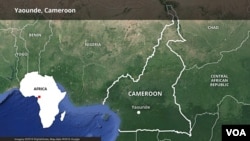Leaders of Cameroon's indigenous forest peoples say their survival is at risk if they are further deprived of access to the lands that are the source of their livelihoods.
Speaking in Cameroon's capital, Yaoundé, indigenous representatives said they had experienced increasingly serious violations of their land rights by palm oil and other agro-industries, mining firms and timber concessions, as well as the process of creating protected areas on their ancestral lands.
“This disturbing situation foreshadows a future where we, as indigenous peoples, will no longer have land,” said Hélène Aye Mondo, president of Gbabandi, an organization of more than 50 indigenous Baka and Bagyeli communities. “If we continue to lose our lands and forests, the very survival of our cultures and peoples is at risk.”
At the meeting on Tuesday, forest community leaders signed a joint declaration calling for recognition and respect of their customary land rights, timed to coincide with the 10-year anniversary of the 2007 United Nations Declaration on the Rights of Indigenous Peoples, of which Cameroon is a signatory.
Denied access to forest
The U.N. declaration says governments must consult indigenous peoples to gain their consent before approving any decisions that affect how their land and resources are used, and they are entitled to redress for any such activities.
Suzanne Ndjele, a member of the Baka ethnic group from the village of Assoumindelé in south Cameroon, said in a written testimony handed out to journalists that her community no longer has access to the forest they depend on for food and medicine.
Ndjele used to work in the forest, hunting and gathering food and other resources with women from her community. But for the past four years she has not been able to enter it.
“Eco-guards came and told us ‘nobody can go into the forest anymore.’ If we continued to enter the forest we were threatened. I went in and was beaten,” she said.
Not enough land
The forest in question was incorporated into the Ngoyla-Mintom Reserve, created in 2014. Access to parts of the forest was restricted and local people were instead given “community forests,” smaller parcels of land which they say are not enough.
The community forest for Assoumindelé is located 10 km (6.2 miles) away from the village, which inhabitants say is not practical for their everyday activities.
Lydie Essissima, an official with Cameroon's social affairs ministry who attended the meeting, said the government was aware of the problem, and stands by its commitments made in the 2007 U.N. declaration. Cameroon was one of 144 countries that voted in favor of its adoption in 2007.





